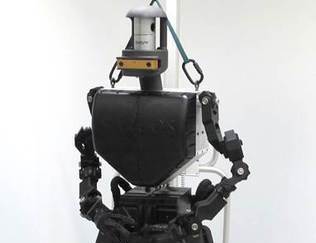Scientists at the MPI for Intelligent Systems receive more than 3 Million Euro ERC Starting Grants
Intelligent Systems Research: Spanning the Length Scale
- 20 January 2015
-
Autonomous Motion
Movement Generation and Control
Smart Nanoplasmonics
Stuttgart / Tübingen. Five years of basic research is secured: The physicist Dr. Laura Na Liu and the computer scientist Dr. Ludovic Righetti, both from the Max Planck Institute for Intelligent Systems, receive an ERC Starting Grant of 1,5 Million Euro, respectively. Prof. Jan Peters, head of the robot learning group at the institute (while mainly active as full professor at the TU Darmstadt) will invest part of his ERC starting grant into his research group at the institute. The researchers have won against 3.273 applicants - only 10 per cent of the submitted project appraisals receive the requested award, granted by the European Research Council (ERC).
Because of the intense competition, the grants grade up the curriculum vitae of the researchers and enable young scientists in Europe, which are in their second to seventh year after graduation to develop their own career towards an independent scientist.
Humanoid Robotics in Tübingen
Additionally, Dr. Ludovic Righetti could convince the expert panel in Brussels. His project CONT-ACT deals with control of contact interactions for robots acting in the world. As a part of his research, Righetti poses the questions: “What are the algorithmic principles that would allow a robot to run through a rocky terrain, lift a couch while reaching for an object that rolled under it or manipulate a screwdriver while balancing on top of a ladder? Answering this seemingly naïve question resorts to understanding the fundamental principles of robot locomotion and manipulation, which is very challenging. However, it is a necessary step towards ubiquitous robots capable of helping humans in an uncountable number of tasks”.
The project CONT-ACT has the ambition to develop a consistent theoretical framework for motion generation and control where contact interaction is at the core of the approach and an efficient use of sensory information drives the development of high performance, adaptive and robust planning and control methods. As it learns better sensory models, the robot constantly improves its performance. It is a step towards a general theory for robot movement that can generically be used to control any robot with legs and arms for both manipulation and locomotion tasks and that allows robots to constantly improve their performances as they experience the world.
Ludovic Righetti studied at the Ecole Polytechnique Fédérale de Lausanne where he received a Diploma (eq. MSc) in Computer Sciences in 2004 and a Doctorate in Science (eq. PhD) in Nov. 2008. His doctoral thesis was awarded the 2010 Georges Giralt PhD award for the best robotics thesis in Europe. He was a postdoctoral researcher at the University of Southern California from 2009 to 2012 and became the leader of the "Movement generation and control" group at the MPI for Inelligent Systems in September 2012. He is particularly interested in the development of algorithms for autonomous robots, with a special emphasis on humanoid robots. His main research topics include legged locomotion and dexterous manipulation.
The goal of Prof. Jan Peters project „SKILLS4ROBOTS“ is to develop a autonomous skill learning system that enables humanoid robots to acquire and improve a rich set of motor skills. This robot skill learning system will allow scaling of motor abilities up to fully anthropomorphic robots while overcoming the current limitations of skill learning systems to only few degrees of freedom. To achieve this goal, it will decompose complex motor skills into simpler elemental movements – called movement primitives – that serve as building blocks for the higher-level movement strategy and the resulting architecture will be able to address arbitrary, highly complex tasks – up to robot table tennis for a humanoid robot.
Jan Peters is a full professor for Intelligent Autonomous Systems at the Computer Science Department of the Technische Universitaet Darmstadt and at the same time a group leader at the Max Planck Institute for Intelligent Systems, where he heads the interdepartmental Robot Learning Group. He has studied Computer Science, Electrical, Mechanical and Control Engineering in Munich, Japan, Singapore and Los Angeles receiving four Master’s degrees and one Ph.D. from the University of Southern California. His robotic research has been awarded with several prizes at renowned robotic conferences.
Innovative Nano-Research in Stuttgart
Dr. Laura Na Liu
submitted her project with the title „dynamic nanoplasmonics“ and suceeded finally at the interview stage in front of an international expert panel in Brussels. Only 30% of applicants survive this last hurdle.
“The ERC grant provides a significant opportunity for me to engage with other pioneering scientists in the field, which helps me gain ideas and motivation for furthering my research career. The accomplishment of this research proposal will be an invaluable asset to my career as an expert in the field of nanophotonics and biochemistry. The long-term endeavor of my group is to gain a leading role in this cutting-edge research field and to continue to pursue excellence” states Dr. Laura Na Liu.
The project „dynamic nanoplasmonics“ got approval by the expert pannel and independant research is now secure for the next 5 years.
Laura Na Liu`s group works at the nanometer scale, where chemistry, biology, and materials sciences converge. The subtopic of nanoplasmonics deals with localization and manipulation of light in a nanometer volume. The key material component for plasmonics is metals. The optical properties of metal nanoparticles have been an object of fascination since ancient times. When light interacts with a metal nanoparticle (for example a gold colloid in a stained church window), collective oscillations of conduction electrons known as particle plasmons are excited.
Functionalized metallic nanoparticle assemblies with well-designed configurations enable intriguing optical properties and offer a helpful hand for understanding profound biochemical behavior. The group focuses on developing sophisticated and smart plasmonic nanostructures for answering structural biology questions and catalytic chemistry questions in local environments.
Laura Na Liu wants to develop a new generation of dynamic nanoplasmonic building blocks for biology, chemistry, and materials science. These plasmonic building blocks either can exhibit dynamic structural changes themselves or can be integrated with functional materials, where dynamic events take place. With such plasmonic building blocks, long-standing questions in protein dynamics, chiral sensing, dynamic light matter interaction, gas-phase catalysis, and phase transitions on the nanoscale will be addressed. The proposed methods will allow for unprecedented resolution when optically disseminating dynamic behavior and revolutionary multidisciplinary experiments that were not possible to be performed before.
After the study of Physics in China, she graduated with a Doctor degree from University of Stuttgart in 2009, where she had focused on the studies of metamaterials at optical frequencies. Returning from a 2 year-stay for research in the United States, she has been leading an independent research group “smart nanoplasmonics” at the Max-Planck-Institute for Intelligent Systems in Stuttgart since 2012. Her group focuses on developing sophisticated and smart plasmonic nanostructures for answering structural biology questions and catalytic chemistry questions in local environments.
Her research work was honored with several prizes. Besides the very prestigious Hertha-Sponer award of the Deutsche Physikalische Gesellschaft for the best female physicist of the year 2010, she was also honored with the BMBF Nanowissenschaftspreis 2011. One year later, she was granted one of the prestigious Sofia Kovalevskaja Awards by the Alexander von Humboldt Foundation. In 2013, she became Fellow of the Elisabeth-Schiemann Kolleg of the Max Planck Society and in 2014, she was honored with the prestigious Heinz Maier-Leibnitz Award from the Deutsche Forschungsgemeinschaft.




